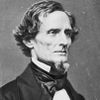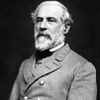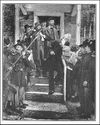User:T3canolis/American Civil War
“Huh?”
The American Civil War was a war fought between Americans from 1861 to 1865. However, the war was extremely civil and polite. It is an anomaly in history just how civil the war was. While there was fighting, all firing was accompanied with a "How do you do?" or a "Hello, good friend!" There was no sarcasm to these remarks; they were just incredibly civil people.
The opposing sides were the Union from the North and the seceding Confederates from the South.
The People[edit | edit source]
The American Civil War produced many heroes and villains, notable people, and infamous people. However, I cannot stress how civil these people were.
The Union[edit | edit source]
The Union had two notable figures that were mostly notable for the extreme civility they showed.
Abraham Lincoln[edit | edit source]
Abraham Lincoln was the president of the United States during the Civil War, and he led the Union to a very civil victory. The most notably civil thing he did was issue the Emancipation Proclamation, a document that freed all of the slaves in rebel states. The civility in this document was that due to careful wording, zero slaves were freed by it, thus not causing any emotional harm to anyone at all. Imagine if he would have freed the slaves in the states still in the Union. That would have made a lot of people angry, and wouldn't have been a very civil move. Therefore, it seemed as though the only civil decision to be made was to free no slaves.
Lincoln's true civility was found in his honesty. His nickname was "Truthful Abe" or something like that. He would never ever tell a lie. In fact, when he was a boy, he chopped down a cherry tree, and after his father accused him of it, he admitted that he did it. Truthful Abe found a complete and utter lack of civility in telling lies, therefore he avoided it.
Due to his actions and complete civility during the conflict, he is often celebrated as one of the greatest presidents in American history, often just behind George Washington, who ironically was not very civil. This has caused many to accuse historians of not really knowing anything about history and to request that historians reevaluate how much civility enters into their thought process when ranking presidents.
Ulysses S. Grant[edit | edit source]
Ulysses S. Grant (born Useless Grant) was the final general in the Union army after some random dude and a guy named Prostitute. He had gained military recognition due to his fighting in the Mexican-American War, a conflict so uncivil I will not continue to talk about it in this piece. He was the owner of a manly beard and smoked many cigars. He was very considerate with both these things, though. He would only maintain his beard when no one else was around as to not offend those who couldn't grow such a respectable mane. In addition, he would smoke only along with fellow smokers as to not clog the lungs of bystanders.
Grant may appear to some to be an uncivil general due to his use of the tactic of siege at the Battle of Clicksburg (named for the Adam Sandler dramedy). Once again, you have to look a little more closely. During the siege, he frequently exchanged pleasantries with the Confederate soldiers stuck inside the city. He would keep them up to date on current events and let them know exactly which disabled neighbor their wives were cheating on them with. It was all a great time for everyone involved. Anything that says otherwise is just revisionist history.
Ulysses S. Grant would become president himself where he surprisingly had a very uncivil term, complete with scandals and the like. Unfortunately, Grant would go punished for this as he was killed by the most uncivil disease of all, mouth cancer, whose complete lack of civility offends you before it kills you.
The Confederacy[edit | edit source]
The Confederacy had a famous president and general as well. As with the Union, most historians emphasize how unimportant they would be if not for their civility.
Jefferson Davis[edit | edit source]
Jefferson Davis was the first and only president of the Confederate States of America (unless of course the South rises again). While that makes him the most civil president in the nation's history by default, it is assumed by many credible historians that he would be the most civil president if the nation had 1000 executive leaders. Jefferson Davis was so civil, he moved the capital of the Confederacy closer to Washington D.C just so he could send greeting cards to Abraham Lincoln faster.
Before being the president of the Confederacy, Davis was a mere senator from Mississippi. Even then, he was incredibly civil. He was involved in exactly zero physical altercations with other congressmen. That cannot be said with all of them. As the debate about slavery raged on in the years preceding the Civil War, he remained civil with his northern opponents, often offering them freshly baked cookies during filibusters. When Davis was chosen to the president of the Confederacy, most Northerners shrugged and let out an "Eh," as to say, "It could have been worse."
Davis led the Confederate States in a very civil way, never once raising his voice. This was odd for leaders at this time as executive offices were often filled with shouting and arguing. Davis basically rolled over during all discussions simply to remain civil. Some historians postulate that the Confederacy would have been much more successful if Davis had cared more about winning the war than maintaining a civil tone. Most at the time, however, appreciated the sentiment.
Robert E. Lee[edit | edit source]
Robert E. Lee, affectionately called Bobby Lee by no one, was most likely the most civil man in the civil war. Now that's saying something. The civility that Bobby Lee carried himself with has been matched by no one in any facet of life. Many predict that if the Multiverse Theory is accurate, there is no other Universe in which there is a man more civil than Bobby Lee was in the civil war. It is downright impressive how civil the man was.
Bobby Lee commanded virtually nothing out of his troops because commanding would be inconveniencing. He would shrug off most stuff and figure that it would get done by itself. What he was, however, was a master strategist. Of course, when I say he was a master strategist, I mean in the context that he was very good at maintaining civility in all of his tactics. For example, if the Union was losing a battle by a lot, he would send in some troops to be slaughtered just to raise the self-esteem of his enemies.
Civility was probably Lee's downfall. He entered with several health problems just because he was too damn civil to say no. Oddly, he didn't think of how uncivil it was to not disclose your health problems to the army you will be leading. That was perhaps his only oversight.
The Prologue[edit | edit source]
In a startling deviation from the war itself, the events leading up to the Civil War were completely uncivil. It was quite shameful how little civility these events had. Many historians believe the reason the Civil War was so civil is because everyone felt bad because of how uncivil they acted before it.
The Compromise of 1850[edit | edit source]
On the surface, the Compromise of 1850 sounds very civil because it was a compromise, but in all reality, it was nothing of the sort. The Compromise of 1850 was an uncivil compromise because it simply made all sides equally angry, a cheap, uncivil way to try to solve a conflict. The compromise was uncivil to Northerners as it gave took away runaway slave rights and uncivil to Southerners as it made more northern states. Most of all, it was uncivil to lovers of language because it completely and utterly betrayed the word compromise. Compromises are supposed to be a benefit to everyone and most of all, they are supposed to be civil. This one was not.
Nevertheless, the so-called compromise was signed into law and no one gained from it. The civility of the era took a nosedive following this event. If you are often offended by acts completely lacking in civility, you should stop reading.
The Kansas-Nebraska Act[edit | edit source]
The most uncivil piece of legislation ever signed into law was the Kansas-Nebraska Act which literally removed all of the civility from two states. The civility from Kansas and Nebraska was destroyed and replaced with the complete and utter uncivility.
The law on paper seemed incredibly civil. It said that rather than allowing the government force states' hands, states should be able to decide whether or not they want slaves for themselves. Many scholars who devote their time solely to studying civility and the word itself would call any situation where people are able to decide for themselves very civil. Unfortunately, that was not the case. Although the legislation was civil, the people were not. They fought over what the state would do, rendering Kansas and Nebraska uncivil. It was called "Bleeding Kansas" as Kansas was figuratively bleeding civility.
The Caning[edit | edit source]
Following the Kansas-Nebraska Act, a moderately civil Senator Charles Sumner verbally attacked slave supporters in Congress. Although calling someone else out is in itself uncivil, compared to most actions of the era, it was passable in the civil department. However, one of the men called out's nephew, a Representative Preston Brooks, decided to attack Sumner in his chambers with a cane, rendering Sumner incredibly injured and with a brain injury. The incident itself was a black eye on the face of an already uncivil era. Quite a doozy. What made this more uncivil, however, was that most southerns supported Brooks. The most uncivil type of support, however, was how many sent him canes. Even with mailbombs and anthrax on the table, it is inarguable that those canes were the least civil things ever sent in the United States, dating back to its inception.
John Brown[edit | edit source]
One of the few men involved with the conflict who did not act wholly civilly or wholly uncivilly was John Brown, an abolitionist. His intentions of freeing the slaves were incredibly civil. There is nothing, according to aforementioned scholars of the word "civil," more civil than freeing an oppressed people. However, the way Brown went about doing this was attacking a town with few slaves and uncivilly murdering people who didn't own a single slave. It's uncivility rested in its sheer misguidedness. Most abolitionists agreed with the idea behind it, but were floored when he took such an uncivil course of action to accomplish it. It was a bit counter-productive, they would say, to attempt to do the most civil thing one can in an uncivil manner.
Secession[edit | edit source]
If you were hosting a party, and a bit less than half of the attendees decided to stay where they were but form their own, separate party in the same place, you would consider that act very uncivil, correct? Well, that's exactly what happened prior to the Civil War, and it was the last uncivil thing committed in the era, as it made most realize that they probably should act more civilly towards each other and what have you. The Southern states, starting with South Carolina, without a trace of civility, left the Union without as much as saying goodbye (at least not in a civil manner). This was all in response to Abraham Lincoln being elected to the presidency of the United States. Once all of the states left and the confederacy was formed, it is said that all major political and military men from both sides gathered in one room and declared their want to make the Civil War the most civil conflict in the history of the world.
The Beginning[edit | edit source]





